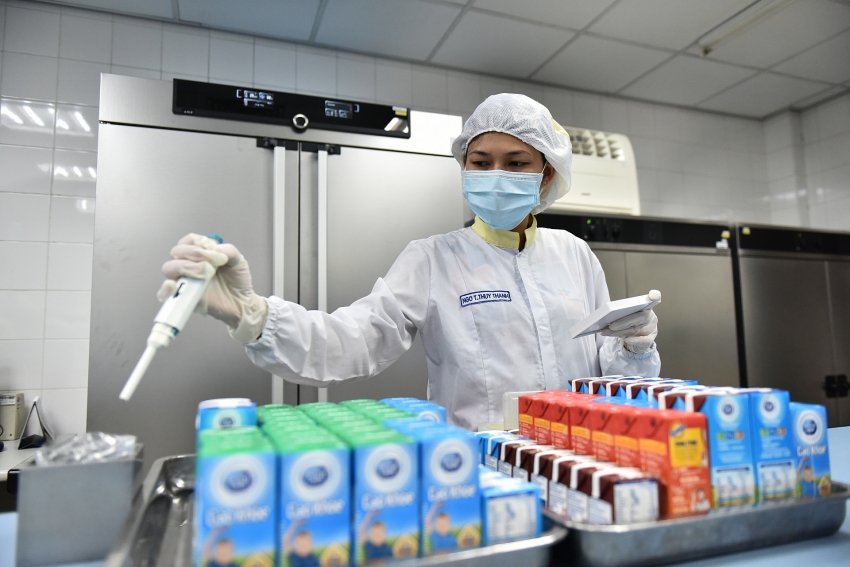FrieslandCampina offers best products amid growing milk consumption
According to a recent 2021 study by ADM OutsideVoice – the independent research arm of US-backed ADM Group – since the outbreak of COVID-19, up to 77 per cent of consumers tend to find ways to improve their immune systems via dairy products or products containing probiotics, prebiotics, and postbiotics.
 |
| FrieslandCampina has been improving the quality of its milk products to meet rising consumption demand |
Also, a recent study by Nielsen showed that Vietnamese consumers are now most concerned about their health. About 65 per cent of consumers stand ready to pay more for products that are good for health.
Vietnam is among the nations with relatively low per capita milk consumption in the world, at about 26-27 kilogrammes per year, versus 100kg in the world and 38kg in Asia. However, according to Kantar Worldpanel, the demand for milk in Vietnam will increase because of the country’s young population and increased income, in addition to higher spending on health, with rising demand for fresh milk, yoghurt, and cheese.
Currently, at many supermarkets in Ho Chi Minh City, shoppers are picking up milk products as a top priority after instant noodles and pork, followed by other items such as rice, cooking oil, fish sauce, and toilet paper.
Nguyen Van Tuan, a resident from the city’s Go Vap district, said that his four-member family has increased the use of milk and cheese products during social distancing.
“All of our family members have to stay indoors to prevent the pandemic and we consume more milk and cheese. Previously, these products were mostly used as supplements. However, after meals, now all family members drink milk to energise our bodies and bolster our immune systems,” Tuan said.
Meanwhile, Do Thi Toan, a factory worker from Ho Chi Minh City’s Hoc Mon district, also said that though the COVID-19 has caused a reduction in her family’s income, in these days of social distancing, she has been increasing milk and yoghurt in her family's diet.
“This is the fourth outbreak of COVID-19 with a rise in patients, so our family is quite worried. The pandemic will last, so we must put priority on protecting our health,” Toan said.
She has added milk products to the family diet as well as products of safe and famous brands.
Meanwhile, Ngo Thi Thoa, a resident of Ho Chi Minh City’s Tan Binh district said, “We also used to drink milk, but not so much. However, we have changed our mind since the pandemic and now use more milk products to protect our health. We have all been feeling stronger and healthier so I think we will maintain this new habit.”
Aware of the new trend in milk consumption, FrieslandCampina is among the few enterprises in the local milk industry that have been constantly investing in improving production lines and facilities with the application of state-of-the-art technologies from the world in a bid to market the best milk products.
Currently, the safety level of FrieslandCampina’s products has exceeded the country’s standards by 11 times. In addition, the company has also had its own set of global nutritional standards, which have helped all products ensure the maximum content of nutrious natural substances such as calcium, protein, sugar, salt, and fat. The products also have supplementary substances such as vitamins A, B12, and D which many children are lacking.
FrieslandCampina has improved its ranking from eighth (2016) to fourth (2018) on the list of the 22 largest nutrition and foodstuff groups in the world of the Access to Nutrition Foundation that have made big contributions to developing and improving global nutrition, which is an independent non-profit organisation based in the Netherlands which is dedicated to objectively assessing and improving the contribution the private sector makes to addressing global nutrition challenges.
What the stars mean:
★ Poor ★ ★ Promising ★★★ Good ★★★★ Very good ★★★★★ Exceptional
 Tag:
Tag:
Related Contents
Latest News
More News
- The generics industry: unlocking new growth drivers (February 04, 2026 | 17:39)
- Vietnam ready to increase purchases of US goods (February 04, 2026 | 15:55)
- Steel industry faces challenges in 2026 (February 03, 2026 | 17:20)
- State corporations poised to drive 2026 growth (February 03, 2026 | 13:58)
- Why high-tech talent will define Vietnam’s growth (February 02, 2026 | 10:47)
- FMCG resilience amid varying storms (February 02, 2026 | 10:00)
- Customs reforms strengthen business confidence, support trade growth (February 01, 2026 | 08:20)
- Vietnam and US to launch sixth trade negotiation round (January 30, 2026 | 15:19)
- Digital publishing emerges as key growth driver in Vietnam (January 30, 2026 | 10:59)
- EVN signs key contract for Tri An hydropower expansion (January 30, 2026 | 10:57)























 Mobile Version
Mobile Version